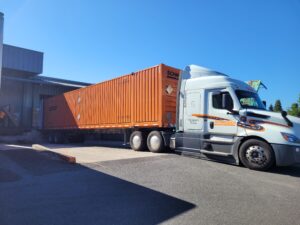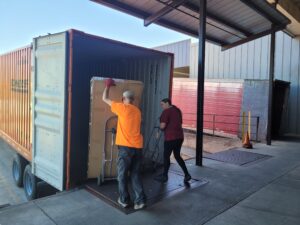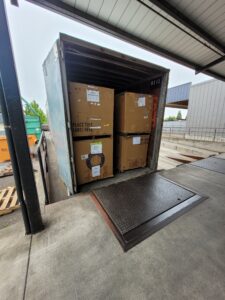Who would expect modestly sized Eugene, Ore., to become a nationwide nexus for shipments of high-quality products discarded by some of the largest U.S. retailers? But that’s exactly what has happened, thanks to the innovative waste-diversion and revenue-generation model employed by St. Vincent de Paul Society of Lane County, Inc. (SVdP), a Eugene-based nonprofit and approved Environmental Partner of 1% for the Planet. Our approach to how we receive a retail shipping donation means better for the community and for the planet.
After being preemptively steered clear of the nation’s landfills, hundreds of freight loads arrive here every year at the doors of SVdP’s receiving warehouse, easily accessible for long-haul trucks just off of Interstate 5 in North Eugene. And once off-loaded with care rather than unceremoniously dumped, the many thousands of products that make up these loads add fuel to a resale engine that powers SVdP’s successful brand of social entrepreneurship.
In fact, SVdP conducts one of the most extensive nonprofit waste-based businesses in the United States. It encompasses 13 St. Vinnie’s retail-thrift stores in Oregon, the oldest and largest mattress-recycling business in the nation, and other recycling and manufacturing initiatives that all work together to support hundreds of quality jobs and create sustainable revenue for SVdP’s charitable programs.
As the largest nonprofit human-services agency in Lane County, SVdP uses this core revenue to sustain a much-needed social safety net in the communities it serves. This includes emergency and homelessness assistance, youth and family services, supportive and permanent affordable-housing programs, and other resources to help society’s most vulnerable achieve stability and self-sufficiency.
Value added through St. Vinnie’s system of retail shipping donation
One of the most obvious sources of support for all of this is the general public, in the form of reusable and recyclable items brought to St. Vinnie’s dropoff locations. SVdP accepts tax-deductible donations of clothing, furniture, housewares, electronics, appliances, all manner of miscellaneous material (more information) and even used vehicles, which are serviced as needed and resold at St. Vinnie’s Car Lot in Eugene.
Customers often assume that everything they see for sale by St. Vinnie’s came to the organization for free, but it’s not that simple. SVdP has forged mutually beneficial collection partnerships with a variety of other organizations that bring volumes of used books for reselling, masses of retired mattresses for recycling — and millions of pounds of new and nearly new merchandise for passing on to customers at huge discounts from retail prices.
But these shipped donations don’t come free. SVdP pays significant freight costs to bring products by both truck and rail from points around the country, for resale via St. Vinnie’s stores across Oregon. SVdP also employs 12 CDL drivers and maintains its own fleet of box trucks and larger semi-trucks, with access to a pool of more than 300 semi-trailers in the Northwest. They haul products daily from three sorting warehouses to stores across Eugene-Springfield and Lane County, from Oakridge in the east to Florence in the west, and as far north as Salem and The Dalles.
It’s possible for so many long-hauled items to appear on St. Vinnie’s shelves only because they are first procured through careful staff negotiation and relationship-building with donor companies, and then carried through a logistics-heavy process by drivers, warehouse sorters, store associates, and others employed by SVdP.
The same is largely true for most items donated locally by community members and offered for resale. It’s true that St. Vinnie’s gets them “for free,” but through receiving, sorting, distributing, marketing, pricing, shelving, and providing customer service to sell these products, and in certain cases even washing or lightly refurbishing them, multiple SVdP employees handle items along the way and add to their embodied value.
Whatever the type of item or wherever it originated, St. Vinnie’s ultimately strives to provide affordably priced resale products to satisfy its discount-minded thrift shoppers. Management also prioritizes distributing just as many quality materials to small stores serving rural customers as it does to large metro-area stores with more incoming local donations.
Carefully balanced with providing the greatest possible value to customers, decisions around pricing at St. Vinnie’s also weigh the need to generate adequate revenue to support both SVdP’s workforce and the social services so important to its community.

Consumers, companies, communities benefit
In the end, SVdP is able to deliver great value to both bargain-hunting shoppers and to retailers and distributors that need to unload quantities of excess inventory, customer returns, floor samples, and other items that they can’t otherwise sell as new.
So in addition to all of the quality, affordable preowned merchandise customers can always expect to find at St. Vinnie’s retail-thrift stores, they should always be on the lookout for remarkable deals on specialty items from well-known retail brands. From furniture to housewares and décor, personal care products and more, these items are often brand-new in their original packaging and usually offered for 1/3 to 1/2 of original retail price.
Many shoppers enjoy a jolt of buried-treasure excitement when they hit upon these deals, as St. Vinnie’s typically isn’t allowed to advertise brand names and specific product information through its contractual relationships with donor companies.
And those companies seeking sustainable solutions for material donations can rely on SVdP for full-service handling of even large quantities that need to be shipped long-distance to Eugene. SVdP’s logistics staff have well-established access to nationwide intermodal shipping resources that can ensure fast, seamless pickup and transport of donations — even when a donor needs warehouse space emptied quickly, for example. Thanks to these relationships with national freight brokerages, SVdP can pick up materials from any city in the continental United States with just one day’s notice.
Adding to that donation-handling reach, SVdP is the founding member and manager of Cascade Alliance, a nationwide support network for nonprofits working to build waste-based social enterprises benefitting their local communities. Depending on current needs throughout that network, SVdP is able to facilitate acceptance and delivery of material donations among member nonprofits. As just one example, SVdP recently coordinated shipment of more than 3,000 new bed frames, donated by a large furniture distributor, to a Cascade Alliance member in another part of the country — bypassing Eugene to avoid wasting fuel, energy and time.
In SVdP’s highly interconnected world of waste diversion, value in every form is precious and worthy of steering toward its greatest use, whether the final destination is Eugene or somewhere else along the nation’s roads and rails. St. Vincent de Paul has turned Eugene, OR into a national hub for retail shipping donation and waste diversion.


